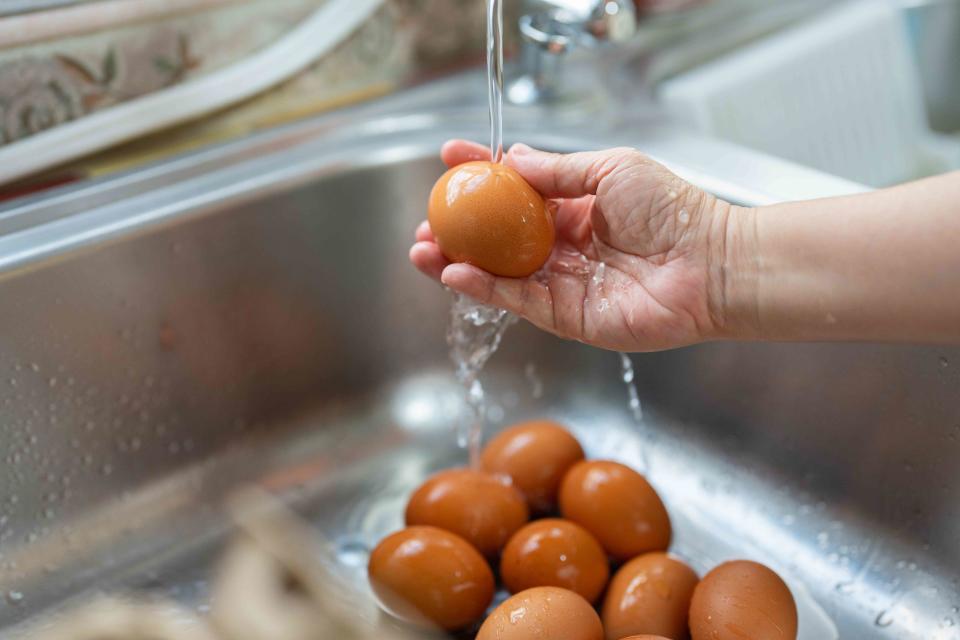Should You Wash Eggs Before Using Them? Get the Final Answer From the Experts
The USDA and our Test Kitchen have the final answer so you can get cracking safely.

Jackyenjoyphotography/Getty Images
Some things always hold true: Never wash turkey, chicken, or ground beef. Always wash leafy greens and all fruits and vegetables, even if they have peels you don’t plan to eat. But should you wash eggs before using them? This is one topic that trips us up more than the others, since the answer depends on what kind of eggs you’re referring to.
So to get the final verdict on “should you wash eggs before using them?” we turned to the USDA and our resident food safety expert and culinary pro, Lynn Blanchard, Better Homes & Gardens Test Kitchen director.
Should You Wash Eggs Before Using Them?
We’ll cut to the chase: It depends, but you can rest assured that the vast majority of the 277 eggs each American eats per year (on average, according to the United Egg Producers) do not need to be washed.
Hens lay eggs with a natural coating on the shell called a “bloom” or “cuticle.” This acts as a first line of defense against any potential bacterial invaders or air (which could speed up spoilage).
“Commercially-produced eggs have been washed and sanitized before they are packed,” Blanchard says, which is a process the United States Department of Agriculture (USDA) requires. This removes that coating as well as any dirt or bacteria. “These eggs do not need to be washed again before using.”
Related: Are Cracked Eggs Safe to Use or Freeze?
Part of the commercial sanitation process involves pasteurization, another USDA Food Safety and Inspection Service (FSIS) mandate for anyone who sells eggs on supermarket shelves. This means that the eggs have been quickly heated and held at a high temp for a certain amount of time to kill any potential bacteria, so as long as your eggs are fresh, refrigerated (more on this below), and the shells are intact, the food safety risk for most populations should be low.
The U.S. Centers for Disease Control and Prevention (CDC) confirms that this holds true even if you like your poached eggs runny or are using your pasteurized eggs in their raw form, as you might in meringue or mayonnaise.
Test Kitchen Tip: Never use unpasteurized eggs for raw purposes.
Should you wash eggs before using them if you’re gathering them from your backyard chicken coop or local farmers market?
“If you’re gathering eggs from your own chicken,” Blanchard continues, or you buy them at the farmers market or from some other vendor that doesn’t clean and pasteurize the eggs, “you can use a damp towel to wipe off any debris on the eggs.”
In addition to brushing off the debris and most chances of bacteria, you’re also taking off that natural “bloom.” Since eggshells are porous, you don’t want to immerse them in water, Blanchard explains. But feel free to wash them individually using 90 to 120° F water to remove any debris. (Colder water has the potential to pull bacteria into the pores of the eggs, while warm water allows the eggs to expand and push any bacteria away.)
For an extra food safety step, you may want to sanitize backyard or farm stand eggs. The Iowa State Extension can walk you through how that’s done.
Do Eggs Need to Be Refrigerated?
Even if they’re pasteurized, all eggs should be refrigerated, Blanchard confirms. Treat any eggs like you might handle dairy products (well, except butter, which is A-OK to keep on the counter if you prefer). Keep eggs in the fridge alongside your milk, yogurt, cheese, and other perishables.
As soon as non-commercial eggs are washed, they should be refrigerated as well. And it certainly can’t hurt to refrigerate unwashed farm or backyard eggs; this will extend their life.
“Store eggs in the cartons you purchase them in and always be sure to use your older eggs first,” Blanchard advises.
In other words, “first in, first out.” Cook or bake with eggs you purchased earlier than any new dozen you happen to acquire.
Related: 8 Egg Substitutes That Go Beyond Refrigerated Egg Product
The Bottom Line
Store-bought eggs have been cleaned and pasteurized prior to making their way to supermarket refrigerator shelves. You do not need to wash eggs you buy at the grocery store. If you have backyard chickens or buy fresh eggs from a local farmer, though, you should wipe them off with a damp towel or rinse them under warm water—without allowing them to soak.
Now that you know the best practices for egg food safety prior to cooking, you’re all set to get cracking with our egg recipes for breakfast, luscious egg yolk recipes, or fluffy meringues. To extend the life of them, consider freezing your eggs. (Yes, you can do that!)
For more Better Homes & Gardens news, make sure to sign up for our newsletter!
Read the original article on Better Homes & Gardens.

